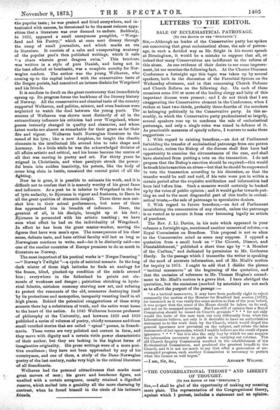LETTERS TO THE EDITOR.
SALE OF ECCLESIASTICAL PATRONAGE.
(TO THE EDITOR OF THE “SPEOITTOR.1
SIR,—Although no leader of the Conservative party has spoken out concerning that great ecclesiastical abuse, the sale of patron- age, in such a decided way as Mr. Bright in his recent speech at Birmingham, it would be a mistake to suppose that all, or indeed that many Conservatives are indifferent to the reform of this abuse. As one evidence of their desire to see some improve- ment, let me mention the following fact. At the Chester Diocesan Conference a fortnight ago this topic was taken up by several speakers, both in the discussion of the Parochial System on the Wednesday afternoon, and in that concerning Church Defence and Church Reform on the following day. On each of these occasions some 200 or more of the leading clergy and laity of this important diocese were present ; and I do not think that I am exaggerating the Conservative element in the Conference, when I reckon at least two-thirds, probably three-fourths of the members as belonging politically to the Conservative party. In this as- sembly, in which the Conservative party predominated so largely, several speakers rose up to condemn the sale of ecclesiastical patronage, and only a single voice was raised in defence of it. As practicable measures of speedy reform, I venture to make these suggestions :— 1. With regard to existing benefices,—an Act of Parliament forbidding the transfer of ecclesiastical patronage from one patron to another, unless the Bishop of the diocese shall first have had opportunity to examine the circumstances of the case, and shall have abstained from putting a veto on the transaction. I do not propose that the Bishop's sanction should be required—this would be to ask him to sanction an abuse—but that he should be empowered to veto the transaction according to his discretion, so that the transfer would be null and void, if his veto were put in within a certain period after the requisite notification and information had been laid lefore him. Such a measure would certainly be backed up by the voice of public opinion ; and it would go far towards put- ting an end to the most disgraceful part of this traffic in ecclesi- astical trusts,—the sale of patronage to speculative dealers.
2. With regard to future benefices,—an Act of Parliament invalidating the consecration of any church, unless the patronage is so vested as to secure it from ever becoming legally an article of purchase.
The Rev. J. Ll. Davies, in his note which appeared in your columns a fortnight ago, mentioned another measure of reform,—a Royal Commission on Benefices. This proposal is not so alien to the Conservative mind as some may suppose. I append a quotation from a small book on "The Church, Dissent, and Disestablishment," published a short time ago by "A Member of the Carlton," and dedicated by permission to Mr. Gathorne Hardy. In the passage which I transcribe the writer is speaking of the need of accurate information, and of Mr. Miall's motion for inquiry in 1872. I ought to add that I dislike the phrase "tactical manceuvre " at the beginning of the quotation, and that the omission of reference to Mr. Thomas Hughes's amend- ment to Mr. Miall's motion is a grave blot. I have abridged the quotation, but the omissions (marked by asterisks) are not such as to affect the purport of the passage :— " As a tactical mancouvre, it may have been perfectly right to reject summarily the motion of the Member for Bradford last session [1872], for inasmuch as it was really the same motion as that of the year before, it was proper that the sense of the House should be taken on its real, and not on its assumed meaning. But I am still of opinion that a Royal Commission should be issued on Church grounds • " • * for not only would the facts of the case turn out very differently from what the Liberationists believe, not only is it desirable to have an authoritative statement as to the work done by the Church, which would dispel the general ignorance now prevalent on the subject, and refute the false statements of her opponents, which I readily believe are the result of pure ignorance • • • but it is also the only way by which we can acquire the information necessary to guide us in carrying out reforms. The old Church Inquiry Commission resulted in the establishment of the Ecclesiastical Commission, and produced the greatest benefit to the Church, and it is not too much to say that after a generation of un- exampled progress, such another Commission is necessary to perfect what the former so well began."


































 Previous page
Previous page